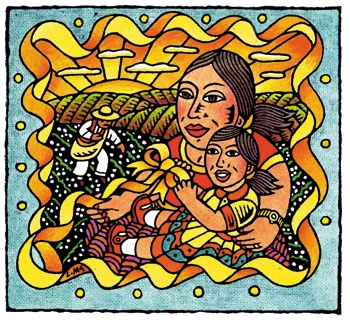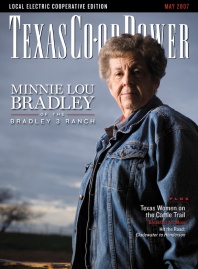My daughter has no Mexican clothes. We discovered this when she came home announcing that her school would be celebrating Mexican Independence Day, Diez y Seis de Septembre.
“I need to wear something Mexican,” Sierra said as I flipped through the hangers looking for a bright fabric, embroidery, ribbons. I look at her, 7 years old, olive skin from me, large, brown eyes like her great-grandmother, full lips from her father and dressed in capri pants and soccer shirt, straight brown hair pulled back in a ponytail, and I think, “You know, mija, technically anything you wear is ‘Mexican.’”
Later, as we finished our dinner, she started on her homework. “What are the flowers of Mexico?” she asks.
“I don’t know. How about cities? I know cities …”
“OK.” She settles for the knowledge I have. I wonder why I don’t know the flowers of Mexico. I know the Texas state flower, the bird, the song. Suddenly I feel like a tourist in my own culture.
So I search for cultural threads to weave into our life. Music. Art. Dance. I tried to sign her up for folklorico dancing, the same dancing I learned as a 6-year-old. I remembered the shiny, black shoes with heels that made loud clacks on the ground as you stomped and bright-colored skirts so full that when you lifted one end up to your head, the middle still trailed onto the floor. My mother pulled my hair into a ponytail so tight I could barely blink, and bright red blush shone on my cheeks.
I called the Mexican cultural center in our community.
“Not till she’s 12,” the woman on the phone said, with no trace of an accent. “Sign her up for ballet.”
Twelve? Hola, I need a cultural infusion now. I need a way to bring back my grandmother’s kitchen where I grew up, sneaking bits of masa as Spanish filled the air. Where I watched the masked wrestler “El Santo” from behind the living room couch.
Our house is filled with CNN, Disney and Nickelodeon, with only “Dora the Explorer” tossing in an occasional Spanish word. As Hispanics, my husband and I never really speak Spanish—unless we don’t want the children to understand what we are saying. Sure, our birthdays have piñatas, the papier-mâché shapes that shatter after being hit with a stick, candy raining down on shrieking children. When my grandmother visits, telenovelas whisper from the television at night, and my daughter’s lunchbox often features quesadillas—tortillas and cheese sealed with butter—instead of grilled cheese.
But these are cultural Band-Aids on a missing limb. As our family steps forward into the future, I worry about how much of our inheritance we’ve washed away in the rushing waters of acculturation. These are waters I’ve been bathed in all my life, waters that widen the border well beyond its riverbank.
I find a shirt and skirt my sister brought back from her trip to Mexico City, and Sierra runs around in her costume, dancing into the sunshine of the living room. The embroidery spells out MEXICO in stiff block letters, and I wonder whether I should pull her hair back into a tight ponytail and rub some blush on her cheek.
As my children stretch our family history into a future where borders split political parties, will I give her something more culturally substantial to carry with her than a few Tex-Mex phrases and an embroidered dress?
That night, I give my daughter one end of the colorful ribbon I find in my heart. I tell her stories of her grandfather, who raised cotton after his family had picked it on farms for years. I share the stories of the long trips her great-great-grandfather took to gather salt, a four-day ride away by wagon. I tell her about her great-grandmother, who had never even eaten in a restaurant, taking over ownership of a busy café during World War II, serving tacos to soldiers on leave.
Oye, mija. Listen, my daughter. Your inheritance is in these words. It will not be washed away. You come from a hard-working, loving people, people who were not purely Mexican, not purely Texan, but a powerful melding of history, geography and pride. These are their stories. Take them and weave them into your future.
Winter Prosapio is a Hill Country writer and humor columnist. She wrote “Walking With Grandfather” in the March issue.


